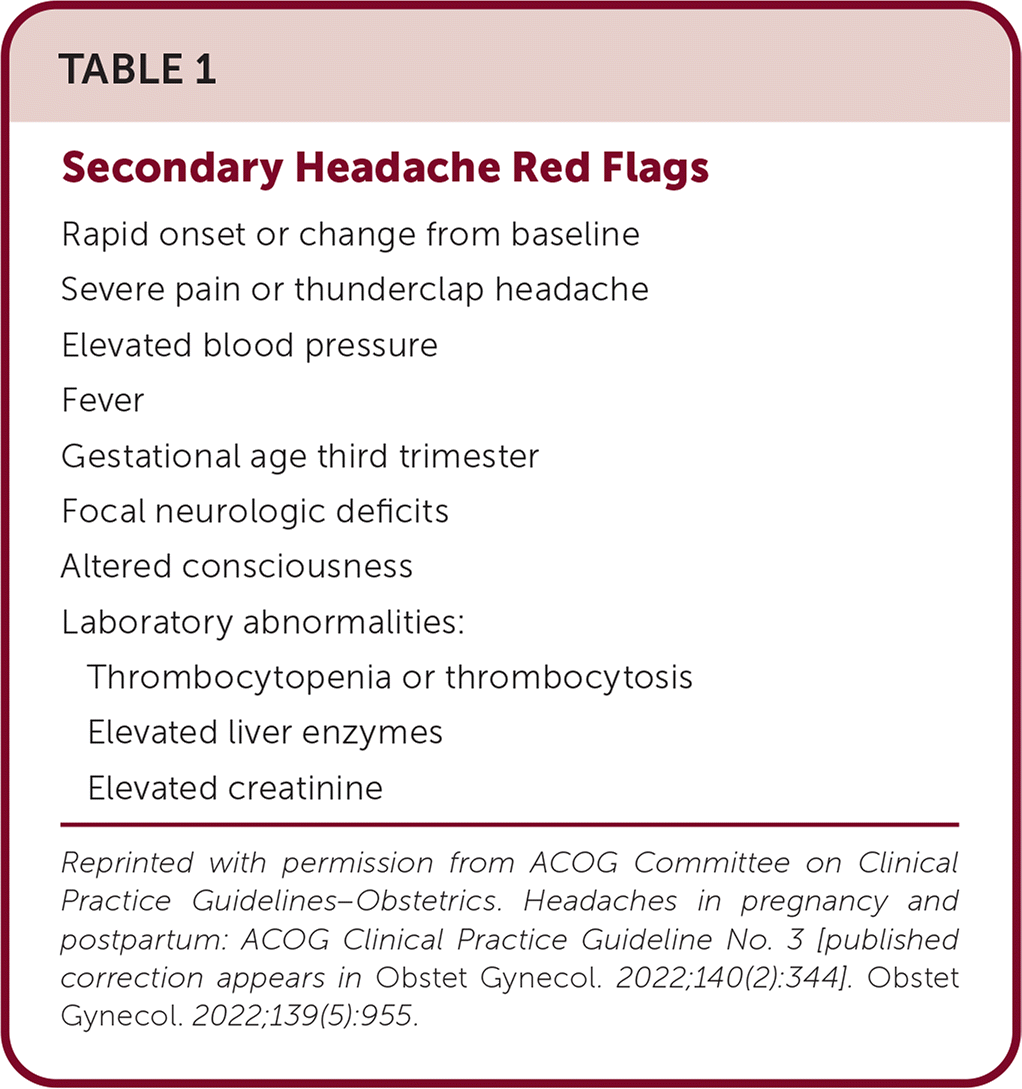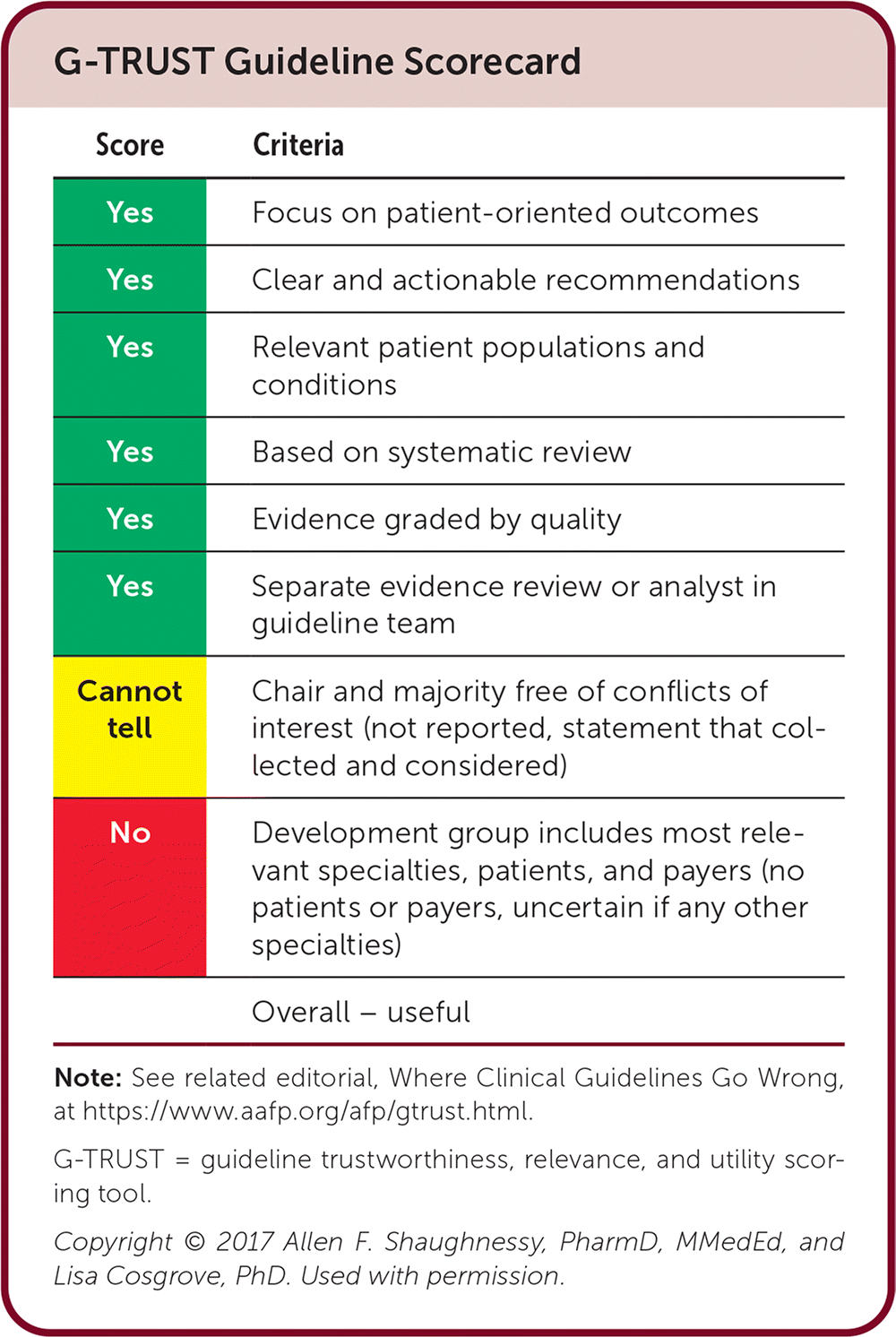
Am Fam Physician. 2023;108(1):97-99
Author disclosure: No relevant financial relationships.
Key Points for Practice
• Calcium channel blockers and antihistamines are the safest migraine prophylactic medications in pregnancy.
• Acetaminophen, with or without caffeine, is the recommended treatment for acute headaches in pregnancy.
• Metoclopramide is recommended for the treatment of persistent headache, especially if associated with nausea.
From the AFP Editors
During pregnancy and after delivery, headaches can be signs of secondary disorders including preeclampsia, dural puncture, pituitary apoplexy, and infection. The American College of Obstetricians and Gynecologists (ACOG) has published guidelines for the evaluation and management of headaches in pregnancy.
Primary Headaches in Pregnancy
Up to 80% of pregnant patients with primary headaches experience spontaneous reduction in frequency by the second trimester. Specific causes unique to pregnancy can trigger a headache.
Medications taken for the prevention of headache should be reviewed before pregnancy, if possible, or early in pregnancy. Some medications for the prevention of migraine increase risk in pregnancy and should not be used. Calcium channel blockers and antihistamines are safe and can be continued or started during pregnancy. Oral magnesium has some evidence of increasing the risk of neonatal death and congenital anomalies in pregnancy, despite the obstetric use of magnesium. Lifestyle modifications such as trigger avoidance, relaxation techniques, sleep hygiene, stress management, hydration, and cognitive behavior therapy have limited evidence of benefit but are safe in pregnancy. Similarly, acupuncture and biofeedback are also safe in pregnancy.
Certain medications have some evidence of risk in pregnancy, including clonidine, tricyclic antidepressants, venlafaxine, carbamazepine, lamotrigine, benzodiazepines, beta blockers, local nerve blocks, nerve stimulators, and supplements like coenzyme Q10 and riboflavin. Angiotensin-converting enzyme inhibitors, angiotensin receptor blockers, gabapentin, topiramate, valproate, calcitonin gene-related protein antagonist monoclonal antibodies, feverfew, melatonin, and onabotulinum toxin should be avoided during pregnancy.
Acute Primary Headache Treatment in Pregnancy
OUTPATIENT
Acetaminophen, 1,000 mg up to three times per day, is recommended as initial therapy for acute migraine during pregnancy. It can be combined with caffeine, up to 200 mg per day. Products containing butalbital should be avoided because it has not shown pain improvement and increases the risk of medication overuse headache and fetal cardiac anomalies.
Nonsteroidal anti-inflammatory drugs should be avoided during the first and third trimesters but can safely be used in the second trimester.
Oral metoclopramide can improve nausea and headache. Consider adding diphenhydramine to counter the akathisia from metoclopramide.
Sumatriptan is recommended for secondary treatment in patients with persistent headache. A safety review by the Agency for Healthcare Research and Quality showed only an increased risk of hyperactivity and emotionality at three years of age. Other triptans have insufficient evidence in pregnancy.
Ergot alkaloids should be avoided in pregnancy because they stimulate uterine contractions. Opioids are not recommended because of an increased risk of medication overuse headaches and neonatal opioid withdrawal syndrome.
EMERGENCY OR LABOR AND DELIVERY TRIAGE
Intractable migraine headaches are initially treated with acetaminophen and caffeine. If this is ineffective, intravenous metoclopramide, 10 mg, and diphenhydramine, 25 mg every six hours, may be administered, as needed. In the second trimester, intravenous ketorolac can be added.
Intravenous magnesium (1 to 2 g infused over 15 to 20 minutes) can be helpful in patients who have migraine with aura and is considered safe in pregnancy.
Intravenous or intramuscular dexamethasone is not recommended due to fetal exposure, but oral prednisone or methylprednisolone can be tried.
Secondary Headaches in Pregnancy
Secondary headaches are common during pregnancy. Headache with any red flags (Table 1) should be promptly evaluated because secondary etiology is found on imaging in more than 25% of cases. Magnetic resonance imaging without contrast media is the preferred imaging modality.

| Rapid onset or change from baseline |
| Severe pain or thunderclap headache |
| Elevated blood pressure |
| Fever |
| Gestational age third trimester |
| Focal neurologic deficits |
| Altered consciousness |
| Laboratory abnormalities: |
| Thrombocytopenia or thrombocytosis |
| Elevated liver enzymes |
| Elevated creatinine |
PREECLAMPSIA AND HEADACHE
Preeclampsia should be considered in a patient at 20 weeks or more of gestation with any headache if blood pressure is elevated. Headache in preeclampsia is commonly severe and bilateral, with blurry vision that can progress to cortical blindness if not treated. The neurologic examination is typically normal in preeclampsia.
In patients with preeclampsia and headache, other diagnoses should be considered if consciousness is altered or there is vomiting or fever. Posterior reversible encephalopathy syndrome presents in preeclampsia with headache, vomiting, altered mental status, blurred vision, and seizures caused by cerebral edema from failed cerebral vasculature autoregulation. Reversible cerebral vasoconstriction syndrome presents with sudden, fluctuating headache, transient blindness, and confusion due to diffuse segmental cerebral artery constriction. Symptoms of preeclampsia often improve rapidly after delivery, although headaches may last for several months.
IDIOPATHIC INTRACRANIAL HYPERTENSION
Idiopathic intracranial hypertension is a secondary headache disorder characterized by retro-ocular frontal headaches and visual symptoms. Although most patients have a history of chronic headaches, it can present for the first time in pregnancy. The increase in pressure can sometimes be seen on imaging, but lumbar puncture is the best way to confirm the diagnosis.
Idiopathic intracranial hypertension is treated with acetazolamide or serial lumbar puncture. Although cesarean delivery does not improve symptoms, operative vaginal delivery is often considered to avoid the increase in intracranial pressure with Valsalva in the second stage of labor.
SEVERE VASCULAR HEADACHES
Central venous sinus thrombosis is a constant nonspecific headache that can occur with seizures or focal neurologic deficits and affects up to one in every 2,500 pregnancies. It most often occurs in the third trimester or postpartum period and is best diagnosed with magnetic resonance venography. Venous thrombosis can mimic a postdural puncture headache. Treatment with low-molecular-weight heparin prevents long-term sequelae. Patients with venous thrombosis should be evaluated for antiphospholipid syndrome.
Carotid artery dissection and subarachnoid hemorrhage can cause severe, refractory headaches in pregnancy. Patients commonly present with a thunderclap headache with neck pain and focal neurologic symptoms. Intracranial hemorrhage may be caused by aneurysms, vascular malformations, or hypertension due to preeclampsia, eclampsia, or HELLP (hemolysis, elevated liver enzymes, and low platelet count) syndrome.
Pituitary apoplexy is a rare, sudden hemorrhage into the pituitary gland that can present with sudden onset of severe headache and visual deficits. It is more common in patients with a history of a pituitary adenoma or who are taking anticoagulants. Pituitary apoplexy requires surgical resection if severe neurologic deficits are present.
INFECTIOUS CAUSES OF HEADACHE
Several infectious causes of headache have been reported in pregnancy. Legionnaires' disease can present as a headache with deteriorating respiratory status and septic shock. Borrelia miyamotoi infection presents with headaches, fever, chills, and fatigue. Neurocysticercosis is a rare infectious cause of headache.
Acute Headache Treatment During Lactation
Acetaminophen, with or without caffeine, and nonsteroidal anti-inflammatory drugs are safe when breastfeeding. Lactating mothers should use caution with caffeine consumption due to slow metabolism in young and preterm infants. Metoclopramide is safe to use during lactation and can increase breast milk production.
Postpartum Secondary Headaches
POSTDURAL PUNCTURE HEADACHES
Postdural puncture headaches can occur in up to 1.5% of women who receive epidural analgesia and present as occipitofrontal headaches that improve when recumbent. Post-dural puncture headaches should be treated with an epidural blood patch. Because of the risk of subdural hematoma and future chronic headaches, conservative care is not recommended for postdural puncture headaches.
PREECLAMPSIA
Preeclampsia should be considered until six weeks postpartum in any patient with headache and elevated blood pressure. Preeclampsia with headache that has severe features should be treated with blood pressure control and magnesium.

| Score | Criteria |
|---|---|
| Yes | Focus on patient-oriented outcomes |
| Yes | Clear and actionable recommendations |
| Yes | Relevant patient populations and conditions |
| Yes | Based on systematic review |
| Yes | Evidence graded by quality |
| Yes | Separate evidence review or analyst in guideline team |
| Cannot tell | Chair and majority free of conflicts of interest (not reported, statement that collected and considered) |
| No | Development group includes most relevant specialties, patients, and payers (no patients or payers, uncertain if any other specialties) |
| Overall – useful |
Editor's Note: This new ACOG practice bulletin improved my concept of headaches in pregnancy, combining treatment of primary headaches with secondary headaches, including preeclampsia and some conditions I have not thought of since medical school. Although the acute and prophylactic treatments are the most useful, this guideline also led me to consider a broader differential diagnosis for the pregnant patient with a new severe headache.—Michael J. Arnold, MD, Assistant Medical Editor
The views expressed are those of the author and do not necessarily reflect the official policy or position of the Uniformed Services University of the Health Sciences, U.S. Navy, U.S. Department of Defense, or U.S. government.
Guideline source: American College of Obstetricians and Gynecologists
Published source: Obstet Gynecol. May 2022;139(5):944–972 [published correction appears in Obstet Gynecol. 2022;140(2):344].
